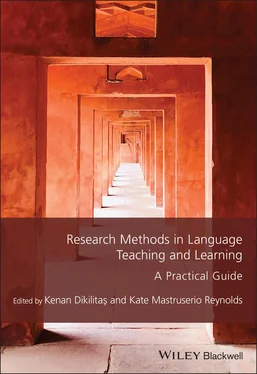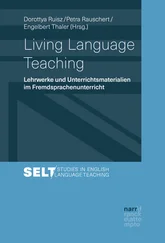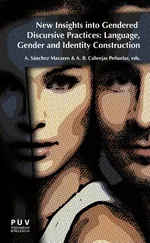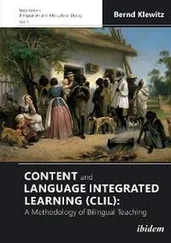Research Methods in Language Teaching and Learning
Здесь есть возможность читать онлайн «Research Methods in Language Teaching and Learning» — ознакомительный отрывок электронной книги совершенно бесплатно, а после прочтения отрывка купить полную версию. В некоторых случаях можно слушать аудио, скачать через торрент в формате fb2 и присутствует краткое содержание. Жанр: unrecognised, на английском языке. Описание произведения, (предисловие) а так же отзывы посетителей доступны на портале библиотеки ЛибКат.
- Название:Research Methods in Language Teaching and Learning
- Автор:
- Жанр:
- Год:неизвестен
- ISBN:нет данных
- Рейтинг книги:5 / 5. Голосов: 1
-
Избранное:Добавить в избранное
- Отзывы:
-
Ваша оценка:
- 100
- 1
- 2
- 3
- 4
- 5
Research Methods in Language Teaching and Learning: краткое содержание, описание и аннотация
Предлагаем к чтению аннотацию, описание, краткое содержание или предисловие (зависит от того, что написал сам автор книги «Research Methods in Language Teaching and Learning»). Если вы не нашли необходимую информацию о книге — напишите в комментариях, мы постараемся отыскать её.
Research Methods in Language Teaching and Learning
Research Methods in Language Teaching and Learning
Research Methods in Language Teaching and Learning — читать онлайн ознакомительный отрывок
Ниже представлен текст книги, разбитый по страницам. Система сохранения места последней прочитанной страницы, позволяет с удобством читать онлайн бесплатно книгу «Research Methods in Language Teaching and Learning», без необходимости каждый раз заново искать на чём Вы остановились. Поставьте закладку, и сможете в любой момент перейти на страницу, на которой закончили чтение.
Интервал:
Закладка:
46 Wright, T. (2005). Classroom management in language education. Palgrave Macmillan.
47 Yi, J.-Y. (2008). The use of diaries as a qualitative research method to investigate teachers’ perception and use of rating schemes. Pan-Pacific Association of Applied Linguistics, 12(1), 1–10. https://files.eric.ed.gov/fulltext/EJ920995.pdf
48 Zimmerman, D., & Wieder, D. (1977). The diary-interview method. Urban Life, 5(4), 479–498. https://doi.org/10.1177/089124167700500406
3 Grounded Theory: A Means to Generate Hypotheses on the Possible Impacts of Student Negotiation in an EFL Speaking Context
Mehmet Sercan Uztosun
Overview
Studying at an English language teaching (ELT) department at a university changed my conceptualization of what language knowledge was. Before university, I believed that I was competent in English because I was successful in my English classes. However, at university I realized that there was much more involved when I was required to study courses that focused on different language skills (i.e., listening, speaking, and writing). Previously my English studies had been limited to reading comprehension and recognizing vocabulary and grammar. In fact, despite my success in English lessons and achievement in the university entrance examination, I could not really claim to be competent in English at all. After two decades, this is still a typical situation in the Turkish educational system: learners of English as a foreign language (EFL) cannot use English communicatively even though they exert considerable effort in their studies and perform well in central examinations. For that reason, teaching English is considered to be a perennial problem in Turkey (Kırkgöz, 2008; Uysal, 2012). However, this is not unique to the Turkish context; it is reported in the literature that ELT in many monolingual regions and countries, such as East Asia (Williams, 2017), China (Lei & Qin, 2009; Pan & Block, 2011), Japan (Gorsuch, 2000), Pakistan (Ali et al., 2009) and Libya (Aloreibi & Carey, 2017) fails to improve learners’ communication skills. Therefore, improving learners’ abilities to use English communicatively seems to be one of the major challenges of EFL teaching in many monolingual contexts. This problem became my main research topic, which I investigated in Uztosun (2013) in my PhD dissertation. As a matter of fact, most of my research work focused on studies that addressed speaking English, as speaking is one of the most essential communication skills and, hence, a significant aspect of language learning (Grainger, 2000; Hall & Austin, 2004; Nunan, 1991).
In selecting a research topic for my Doctorate in Education (EdD) dissertation, my main concern was to conduct a research study that could generate practical implications to improve the effectiveness of EFL speaking classes. These concerns made it essential to develop a hypothesis based on the data collected throughout the research. To do so, I needed to collect rich data and make a thorough analysis on the possible relationships between codes and categories that emerged from data in different phases of my research. I therefore followed grounded theory: it is an effective way to develop theory based on the data gathered and analyzed systematically (Strauss & Corbin, 1998). In so doing, grounded theory enabled me to follow a systematic procedure to collect and analyze data, which led to offering possible solutions to problems that may be experienced in EFL speaking classes.
In essence, there is agreement in the literature about the characteristics of effective speaking classes: students should be active (Littlewood, 1992), highly engaged (Hall & Austin, 2004), and have ample opportunities for talking (Ur, 1996). These are particularly important in speaking classes because the effectiveness of a speaking activity depends on the extent to which it fosters students’ participation. To do so, it is suggested that learning must be relevant to learners’ interests and needs (Littlewood, 1992); and lesson content should be flexible in order to encourage student participation (Johnson, 1995). However, since speaking a foreign language is an anxiety-producing experience (Young, 1990), increasing student participation is challenging because anxious students tend to avoid speaking English.
In seeking possible ways to design effective speaking classes, I learned the term “student negotiation,” which means learner participation in making instructional decisions such as content selection and assessment (Clarke, 1991). Student negotiation means engaging in a dialogue with pupils to identify their interests and understand their views of the learning situation (Doran & Cameron, 1995); it can help in the design of effective speaking classes as it allows for the involvement of students in the decision-making process for the course content. Despite the possible positive outcomes of student-negotiated classes, there were few research studies on student negotiation, and, to the best of my knowledge, no study had investigated student negotiation in the EFL field with particular attention to EFL speaking classes. For that reason, there were no relevant theories to address when making assumptions regarding possible outcomes of student-negotiated speaking classes. This was one of the reasons why grounded theory was implemented in this research, in that grounded theory is useful in contexts where little is known about a particular topic (Holloway & Wheeler, 2002). This study therefore did not rely on an existing theory but aimed to develop a theoretical hypothesis on an under-researched area – the implementation of student-negotiated speaking classes in an EFL setting.
Context
In Turkey, most people are monolingual in that they hear and use spoken English in formal English education, but rarely in any other settings. Kouraogo (1993) terms these contexts as “input-poor environments” since they do not offer ample input opportunities. Being exposed to limited input also delays producing output. Research studies show that EFL instruction is problematic in such contexts, because it is grammar-based (Aloreibi & Carey, 2017; Pan & Block, 2011), relies on translation and memorization (Gorsuch, 2000), and places little emphasis on teaching listening and speaking (Gürsoy et al., 2013). Although I was familiar with the context and able to anticipate possible problems, as suggested by Holliday (2007), I wanted to avoid a taken-for-granted attitude and took on “the discipline of making the familiar strange” (p. 12). This would prevent me from being biased against the problems encountered in that specific class and, hence, enable me to develop an objective researcher point of view.
Considering the lack of input and output opportunities that are available outside the classroom, it becomes critical to offer effective in-class ELT, especially the teaching of communication skills (e.g., listening, speaking, and writing) because the effectiveness of an individual’s EFL learning depends heavily on the quality of ELT provided in schools. To ensure this, research studies should be conducted to provide empirical evidence on how to design effective EFL classes and teachers must be knowledgeable about these matters. The recommendations of research studies could make it possible to combat the challenges of teaching EFL in monolingual contexts. This was my main impetus in selecting EFL speaking as the research topic of my dissertation. In doing so, I attempted to provide a model for designing an EFL speaking class that could be effective for increasing students’ engagement in their learning process.
To achieve the objectives of this research, I engaged in “thick description” (Geertz, 1973); this allowed me to select, organize, and present “interconnected data” (Holliday, 2002) that were collected using different data sources in different stages of the research. To do so, I recorded analytical memos and made notes about the context and other important issues throughout the research. These enabled me to remember the contexts and significant events that were significant to draw conclusions (Heigham & Croker, 2009). Thick description was also important for the credibility and replicability of my research. To ensure this, I reported my research context and research procedure in detail, so that the readers can understand my interpretations and construct their own interpretations (Heigham & Croker, 2009).
Читать дальшеИнтервал:
Закладка:
Похожие книги на «Research Methods in Language Teaching and Learning»
Представляем Вашему вниманию похожие книги на «Research Methods in Language Teaching and Learning» списком для выбора. Мы отобрали схожую по названию и смыслу литературу в надежде предоставить читателям больше вариантов отыскать новые, интересные, ещё непрочитанные произведения.
Обсуждение, отзывы о книге «Research Methods in Language Teaching and Learning» и просто собственные мнения читателей. Оставьте ваши комментарии, напишите, что Вы думаете о произведении, его смысле или главных героях. Укажите что конкретно понравилось, а что нет, и почему Вы так считаете.












